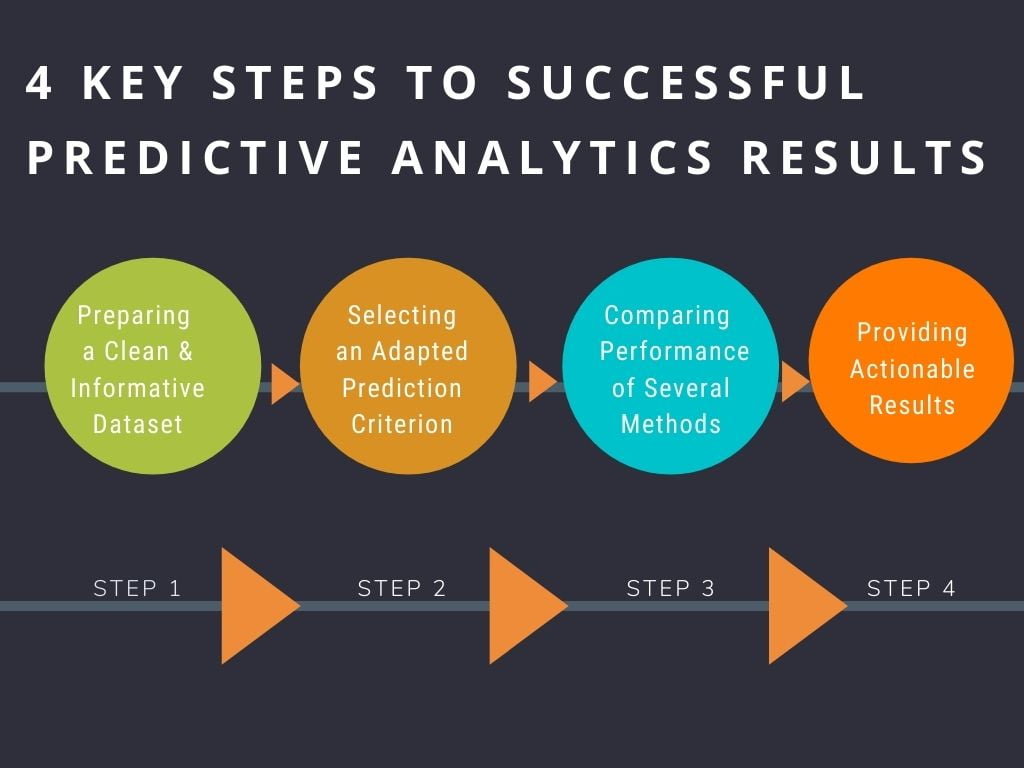Solutions Based Upon Predictive Analytics
Our business analytics unit offers state-of-the-art quantitative tools to implement advanced business analytics procedures. Our mastering of the most recent statistical methods in modelling, data mining & market research coupled with experienced data scientists allows us to help create Business Intelligence for custom problem-solving solutions.
Make the Most Out of Your Data
Machine-learning tools are used to help you make the most out of your data. We are experienced in combining various big data sources (structured and unstructured data).
Find Insights That Matter
Statistical Solutions provides support for all phases involved in the building of a reliable prediction model.

There are 4 steps that we believe require a specific attention:
:: Step 1: Preparing a Clean and Informative Dataset
To start with, a lot of attention should be put on the data preparation phase. It is illusory to believe that any statistical model will be able to perfectly deal with issues like missing values, redundant information, and variables with too many categories. Many can address some of these issues to some degree, but will perform much better if the data have first been prepared adequately. In the same way, it is also illusory to believe that one does not need any information on the data and context of application to build a good model. When the time comes to remove or keep specific variables, it is crucial to know what each one measures or how reliable they are. Therefore, we consider that an adequate preparation of the data to be analysed should never be overlooked.
:: Step 2: Selecting an Adapted Prediction Criterion
Most ways of measuring the predictive ability of a model are based on the idea that different data should be used to build the model and to assess its performance. There are however several ways of implementing that and sometimes, practical constraints also have to be accounted for in the definition of the objective.
:: Step 3: Comparing the Performance of Several Methods
There is no such thing as the overall best modelling technique. Of course, it first depends on the type of response one tries to predict, but it also depends on the context and ultimately on the data themselves. Therefore, we never limit our investigations to a single type of model. We believe that the key to successful predictive analytics lies in testing the performance of several types of models in order to select the one that performs best in a given context.
:: Step 4: Providing Actionable Results
Building a predictive model is rarely limited to providing a set of predicted values. First, the model itself might need to be delivered in a usable manner. Second, the model performance can rarely be summarised with a single performance measure. It typically works well for some data and not so well for others. Last but not least, many recent modelling techniques appear as “black boxes” when one tries to understand what the most important drivers or predictors are and how they affect the response. We make sure to address these issues, notably by providing uncertainty on the predictions and understandable plots and tables illustrating the relationship between the response and the key predictors.

A Few Tips for Successful Analytics
- Know your data and assess their strengths & weaknesses
- Never neglect the data preparation phase
- Do not limit yourself to testing only one model/approach
- Adapt the methodology to your problem rather than trying to make your problem fit into a predefined methodology
Market Research, Segmentation & Targeting
We believe that quantitative methods applied to market research should not only be focused on data analysis, but should actually start with an adequate planning of the study including appropriate questionnaire design and evaluation, and efficient sample selection. Similarly, it should not be limited to providing standard tables and summaries, but also offer tools for visualising and communicating the most relevant findings. Furthermore, it is illusory to believe that a single method can analyse all data, solve all problems and answer all questions. Depending on the specific questions you are trying to answer and the data you have available or are planning to collect, we will suggest and implement solutions that have been customised to be the most efficient ones in their context of application. Typical interventions include:
:: Developing Efficient Designs for Consumer Tests
Randomisation is the key to minimising the risk of getting biased results. Nevertheless, it is rarely wishable or even feasible to completely randomise a test. There are often constraints that should be accounted for, and there are statistical tools that can help take them into account while maximising the information you get from the test.
:: Identifying Consumer Segments that Exhibit Similar Behaviour
In applications such as consumer segmentation, it is crucial to compare results obtained with different analysis techniques. There are many statistical methods available for creating groups in data and one should NEVER rely on the results obtained with a single one without confronting them to those provided by other approaches.
:: Product Mapping
A picture is worth a thousand words…Using statistical mapping techniques, we can create informative plots positioning your products, prototypes and the competition according to their consumer perception, liking and their own sensory properties and characteristics.
:: Developing Predictive Models on Consumer Behaviour
One of our field of expertise is predictive analytics and data modelling. Market research is definitely one of the most important fields of application for these methods.
:: Increasing Your Self-Sufficiency with Data Analysis
Most of our applied training sessions in statistics dealing with data analysis and modelling are relevant for market research and are regularly offered in a customised version. To learn more, visit the catalog of our training sessions offered.
:: Segmentation & Targeting
Our team has over 30 years of experience in state-of-the-art modelling and optimisation. We provide assistance and software solutions to integrate multiple data sources in customer segmentation & targeting processes.
We also implement powerful machine-learning algorithms to maximise the value extracted from the data sources and the accuracy of the segmentation process.
We are especially active with the pharmaceutical industry where we provide support for HCP segmentation. Visit our website dedicated to these applications to learn more:
